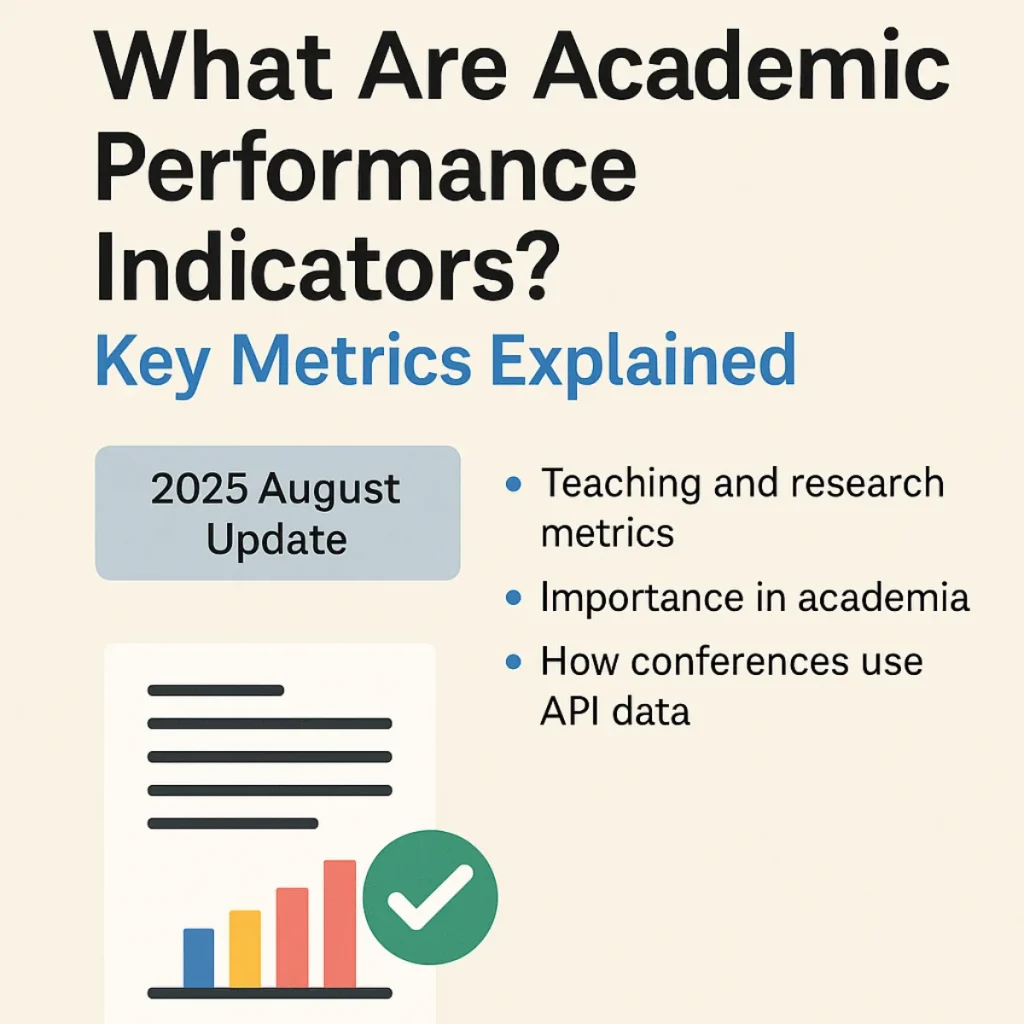What Are Academic Performance Indicators? Key Metrics Explained

Academic Performance Indicators (APIs) have become one of the most essential tools in the academic ecosystem. Whether you are a faculty member preparing for a promotion, a researcher submitting a paper for a reputed conference, or an institution aiming for accreditation, understanding API is crucial.
Explore what Academic Performance Indicators are, why they matter, the key metrics involved, and how they relate to academic conferences.
What Are Academic Performance Indicators?
Academic Performance Indicators (APIs) are a set of measurable values used to evaluate the performance of academic staff and institutions. These indicators assess contributions in three main areas:
- Teaching and student-related activities
- Research and publications
- Professional development and academic contributions
Originally implemented in many countries as part of academic reforms, APIs help standardize how educators and researchers are evaluated.
In 2025, many universities and conference committees rely on these indicators when reviewing speaker proposals, awarding research grants, or selecting keynote contributors.
Why Are APIs Important in Academia?
- Transparent Faculty Evaluation:
API scores help academic institutions ensure fair and merit-based evaluation for promotions, tenure, and hiring. - Quality Assurance:
By tracking API scores, institutions maintain standards in teaching and research output. - Conference Recognition & Participation:
Academic conferences now commonly consider an individual’s API, especially in keynote selection or paper approval stages. A strong API reflects authority and credibility in a subject area. - Funding & Grants:
Many government and private funding bodies assess API scores before approving financial support for projects.

Key Metrics of Academic Performance Indicators (As of 2025)
APIs are usually broken into different categories, each with a scoring system. Let’s look at the updated 2025 structure commonly adopted by higher education bodies.
Teaching, Learning, and Evaluation Related Activities
| Activities | Examples | Typical Weightage |
|---|---|---|
| Classroom teaching | Lectures, tutorials | 70–100 hours/year |
| Mentoring students | Project guides, thesis supervision | 10–20 points/year |
| Innovative teaching | Digital tools, flipped classrooms | 5–10 points |
Research and Academic Contributions
| Sub-Category | Examples | Typical Points |
|---|---|---|
| Research Papers | UGC-CARE, Scopus indexed journals | 10–25 points/paper |
| Conference Papers | National and international papers | 5–15 points |
| Books and Chapters | ISBN-level publications | 10–20 points |
| Research Projects | Sponsored or funded projects | 20–30 points/project |
Professional Development & Participation
| Involvement | Examples | Points Range |
|---|---|---|
| Conference Organization | Chair, session moderator | 5–10 points |
| Invited Lectures | National or international forums | 5–15 points |
| Academic Memberships | IEEE, ACM, INFLIBNET, etc. | 3–8 points |
| MOOC Creation / Participation | SWAYAM, Coursera, etc. | 5–10 points |
2025 Updates to API Evaluation
Several changes have taken place in API systems in 2025:
- Inclusion of AI-generated Content Supervision:
Faculty must now disclose AI assistance in publications and show proper editorial control for full API credits. - Virtual Conference Recognition:
Online and hybrid academic events are now scored equally with offline ones for API calculation. - Mandatory Research Ethics Declarations:
Institutions require proof of ethical compliance for full scoring of research papers. - Global API Normalization Efforts:
Some international bodies are working to harmonize API scoring systems for cross-country academic recognition.
Tips to Improve Your API Score
- Publish in indexed journals like Scopus or Web of Science.
- Document everything: Keep a file of certificates, participation proofs, and publications.
- Take part in academic bodies, workshops, and conferences.
- Start or join funded research projects.
- Explore online course creation via platforms like SWAYAM or Udemy.
Frequently Asked Questions (FAQs)
Q1: Can attending a virtual conference increase my API score?
Yes. As of 2025, virtual and hybrid conference participation is equally valid, provided you have proof of attendance or presentation.
Q2: Do I get API points for non-UGC or non-Scopus journals?
Limited. Most institutions prefer UGC-CARE or Scopus-indexed publications. Journals outside these lists may receive fewer or no points.
Q3: How do I calculate my API score?
Each institution provides its own API calculation form, but they generally follow UGC or similar bodies’ guidelines. You’ll need to tally your contributions across the three main categories.
Q4: Are keynote speaker roles at conferences valuable for API?
Yes. Keynote and invited speaker roles are highly regarded and receive points under professional development.
Q5: How often should I update my API records?
Ideally every semester. Maintaining an up-to-date API log ensures you’re ready for promotions, conferences, or grant opportunities at any time.
Academic Performance Indicators are promotion tool — they’re now a dynamic part of academic identity. In 2025, with the rise of digital research tools, ethical AI use, and international academic collaboration, tracking your API has never been more important.
Whether you are preparing for an international conference or applying for a research grant, your API score can play a defining role in your academic journey.
